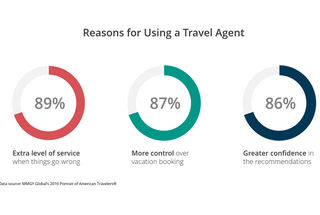Travel Agent 2020



The concept of "travel agent 2020" is on everyone's mind today. It's tempting to be skeptical of all the predictions regarding the future of travel agents, but we can't deny that the digital revolution has already transformed the way we plan book and experience travel.
Another force that is causing major changes in the industry is the Millennials, who have quickly emerged as the largest travel segment. According to a recent Skift report, by 2020 Millenials are expected to make 320 million international trips annually (a 47% increase from 2015), and outpace older generations. Today youth travelers turn to travel agents because of the presumed knowledge of destinations and local providers. Travelers want "local experiences" in their destinations combined with the comforts of home; for example, they want to book the airline/or book the same hotel chain they're used to at home. They want local food, drinks, and events to give them the feeling of being immersed in the local culture. The ability of travel agents to provide this unique, personalized experiences is a great motivator for travelers.
When it comes to personalization, the buzz around chatbots continues to grow. It sounds great to have an AI system to plan and book your dream vacation. Digital Personal Travel Assistants have the potential to improve the travel experience since they will know preferences for airlines and hotels and help streamline the process of choosing rather than actually making the choice. The booking process has never been so simple: insert text, scan the options, approve. But are these chatbots smart enough to make a difference? Full AI ignores the whimsical nature (or indecisiveness) of the Millennial traveler. Travelers are increasingly looking for new experiences and stories that their friends haven't experienced. In this case, a knowledgeable travel agent is the solution for those who want to optimize their experience. This is, the direct counter-trend to fully independent travelers who risk booking on their own and risk quality and security in unknown destinations.
Moreover, when it comes to security, it's easier to get a travel agent to plan all the intricacies of a trip than to do it independently. If something goes wrong on vacation, travelers want an expert who knows how to solve the problems, a human validator who can relieve all the frustration for the traveler.
Also, today's vacation planning takes into account that travel to new location should be combined with an epic event at the destination: Where can I go on vacation next month?" turns into "Your favorite band is playing their final show of the tour in this exotic location and here are some hotel and ticket options" or "That's the week of the world cup final in Brazil, want me to see about ticket options?" Here travel agents can often get better deals than the DIY traveler might be able to find alone.
All in all, despite the negative forecasts over the past decade, travel agents have proven to be more valuable than anyone ever expected. It is doubtful that travel agents will become obsolete, but it is obvious that their role will continue to change in the future, owing not only to the continued emergence of new technology and innovations within the travel and hospitality spaces but also because of increasing demands for personalized service.
About DataArt
DataArt is a global software engineering firm that takes a uniquely human approach to solving problems. With over 20 years of experience, teams of highly-trained engineers around the world, and deep industry sector knowledge, we deliver high-value, high-quality solutions that our clients depend on, and lifetime partnerships they believe in.
www.dataart.com
@dataart
Andrew Sanders
VP, Travel & Hospitality - North America
+1.919.762.6599
DataArt